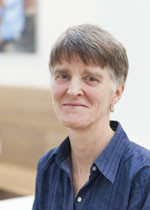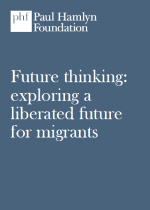Carlos Saavedra reflects on US campaign for the rights of undocumented young people
Carlos Saavedra, a prominent activist for the rights of undocumented young people in the USA, highlighted the importance of developing a narrative and training people in conducting campaigns during a talk at PHF. Activists supporting the cause of undocumented young people captured the attention of the US public and policy makers through a combination of telling a ‘good story’ and organising their movement effectively. The event encouraged UK organisations working with undocumented migrants to think about lessons to be learned from the US experience. Saavedra visited the UK as a guest of Hope not Hate, a campaign to counter racism and fascism in the UK, and spoke at events around the country. In an interview with PHF trustee Beeban Kidron, he shared his story as an initially undocumented immigrant from Peru and his experience of organising thousands of people.
During the conversation, Saavedra underlined the importance of narratives to campaigns for social change, such as the one he led in support of the US Development, Relief and Education for Alien Minors (DREAM) Act, a policy initiative which would represent a step towards citizenship for undocumented people in the USA. His campaign is about the hopes and dreams of young migrants. The so-called ‘DREAMers’ give the immigration debate a human face by putting forward the stories of thousands of undocumented young people. Social media and the web provide a natural platform to share these stories, and also help organise protest. The experience of DREAMers raises the question of what narrative would be effective in the UK to gather large support for undocumented young people.
Reflecting on the early stages of the campaign, Saavedra pointed towards the need for support and training for organisations such as United We Dream, the network he coordinated. United We Dream was to become the largest youth-led network in the USA. When he left college to devote his time completely to the movement, Saavedra was unsure about ways to learn how to better organise such a campaign. First learning from books, then from other organisations and experienced individuals, he eventually trained thousands of DREAMers. Grant-making institutions played a crucial role in the development of the movement and Saavedra argued that funders who wish to contribute to the development of such movements should primarily invest in the training of migrants and their communities.
DREAMers also managed to increase their political weight by making their cause the single most important item on the agenda of the Latino community, which played a crucial role in the re-election of President Obama in 2012. In the UK, however, the undocumented migrant community is nationally and culturally more diverse, prompting questions about the basis of mobilisation for the rights of undocumented people.
Supported Options, a PHF Social Justice Special Initiative, aims to provide support and advice to young people and children in the UK who do not have regular immigrations status. It has recently launched ‘Life Without Papers’, a blog telling the stories of undocumented migrant families and young people in the UK, and is also funding new service developments and other innovative ways of allowing young people to gain more control over their lives.



